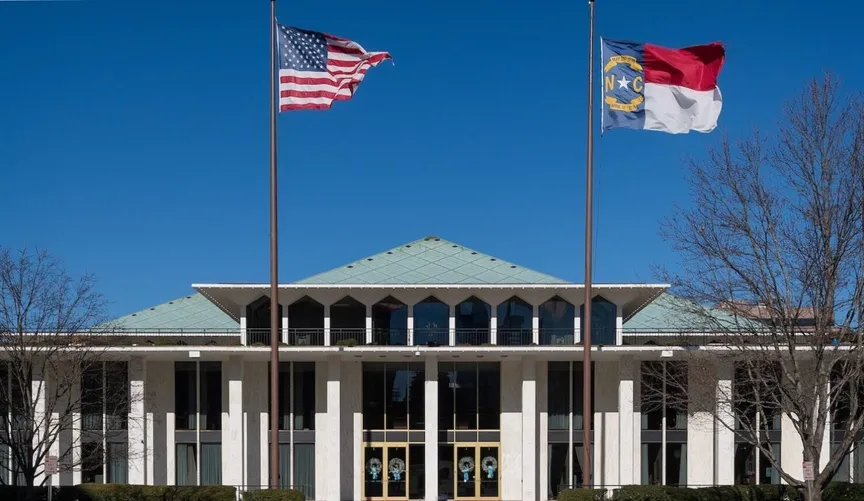
Residential customers of Duke Energy in North Carolina could pay $87 million more per year for electricity under a proposal rocketing through the state legislature, a new study shows. The figure represents about a 4% jump in household bills.
The legislation, Senate Bill 266, would change how Duke distributes the cost of electricity it buys to supplement generation from its own power plants — significantly hiking the share paid by residential consumers and cutting the portion paid by industrial electricity users, like chemical manufacturers and textile mills.
The analysis shows the legislation is a better deal for industrial customers than the status quo, said Will Scott, Southeast climate and clean energy director for the Environmental Defense Fund. “They will pay less to use the same amount of energy, and residential ratepayers will pay more,” he said.
SB 266 is the latest version of a Senate-passed measure that would unravel the state’s climate targets. It was publicly unveiled moments before it was debated and approved by the House Energy and Public Utilities Committee last week, and received fulsome praise from Duke, industrial groups, and others in testimony.
On Tuesday, despite protests from clean energy advocates and some Democratic lawmakers, the bill easily cleared the Republican-controlled House and now returns to the Senate, also run by the GOP.
The study, conducted by independent analysis group EQ Research, has a narrow scope, homing in on the ramifications of just one section of the 30-page bill — the part that covers how purchased power is billed to customers.
“We were pretty laser-focused,” said Justin Barnes, president of EQ Research, “because that’s the analysis we could do with readily available information quickly.”
While Duke generates much of its own electricity from a fleet of fossil fuel and nuclear plants, it also contracts to buy some of its solar power from independent producers and purchases energy from other generators under certain conditions, such as when demand spikes.
Under current law, the entire cost of this purchased power is passed on to customers annually along with a charge for natural gas and other fuels. The utility divvies up the costs of this fuel “rider” between residential and industrial customer groups based partially on their peak electricity demand and partially on their overall energy use.
According to EQ’s analysis of Duke’s latest filings with regulators, the fuel rider totals about $2.75 billion for the company’s two North Carolina entities, Duke Energy Progress and Duke Energy Carolinas. The purchased power portion is around $1.1 billion.
Of the purchased power portion, residential customers currently pay about 41.2%, and use just over 40% of the energy.
SB 266 eliminates any weight given to overall energy use in allocating purchased power costs, according to EQ, shifting charges from large industrial users of electricity to residential consumers. The result is that households would pay just under 49% of those costs while using the same 40% of energy, the group’s study found.
“It is not going to be a savings for us ratepayers,” said Rep. Pricey Harrison, a Guilford County Democrat, speaking against SB 266 on the House floor. “It is going to be an increase.”
The EQ study does not incorporate the potential effects of other parts of the bill, including alleged savings from eliminating a 2030 deadline by which Duke must cut its carbon pollution, and the impact to customers of allowing the utility to recoup some costs for power plants not yet delivering electricity.
Rep. Dean Arp, the Union County Republican championing SB 266, said last week in committee that erasing the 2030 climate target would save all customers a total of $13 billion by 2050. He said allowing Duke to recover plant-construction financing costs early would net them another $1.4 billion. He echoed those claims Tuesday on the House floor, rounding up the total savings by over half a billion dollars.
“A vote against this legislation is a vote to make all ratepayers pay $15 billion more in electricity costs,” Arp said.
But opponents of the bill reject the allegation that striving for more wind and solar energy in the near term will contribute to rising rates, an assertion stemming from an elusive study from the state-sanctioned customer advocate, Public Staff, that hasn’t been provided widely to legislators or members of the public.
Clean energy advocates say the Public Staff analysis considers only the cost of building new power generation, not the rising price of fossil fuels. And they continue to question the wisdom of allowing Duke to charge consumers for costs related to nuclear and gas plants that may never come online.
Perhaps above all, EQ’s findings show why more time is needed to vet the bill with all interested parties, including clean energy and consumer advocates, not just Duke and large industrial customers, critics contend.
“When we rush processes like these and don’t include all the stakeholders, we can end up with results that unfairly burden North Carolina households,” said Scott with the Environmental Defense Fund. “I hope that we can slow down and make the adjustments we need so that this bill doesn’t cause unnecessary pollution or unnecessary costs.”
But the House’s public deliberation of the measure has been anything but slow. In less than a week, it cleared two committees and two required floor votes. It could appear on the desk of Gov. Josh Stein, a Democrat, as soon as this week.
“There are all kinds of reasons to vote no on this bill,” Harrison said to the full House on Tuesday, including its treatment of residential customers, its abdication of climate targets, and the process by which it was rushed through the chamber.
As the House prepared to vote around 7 p.m., she said, “It’s not clear why we’re doing this tonight.”